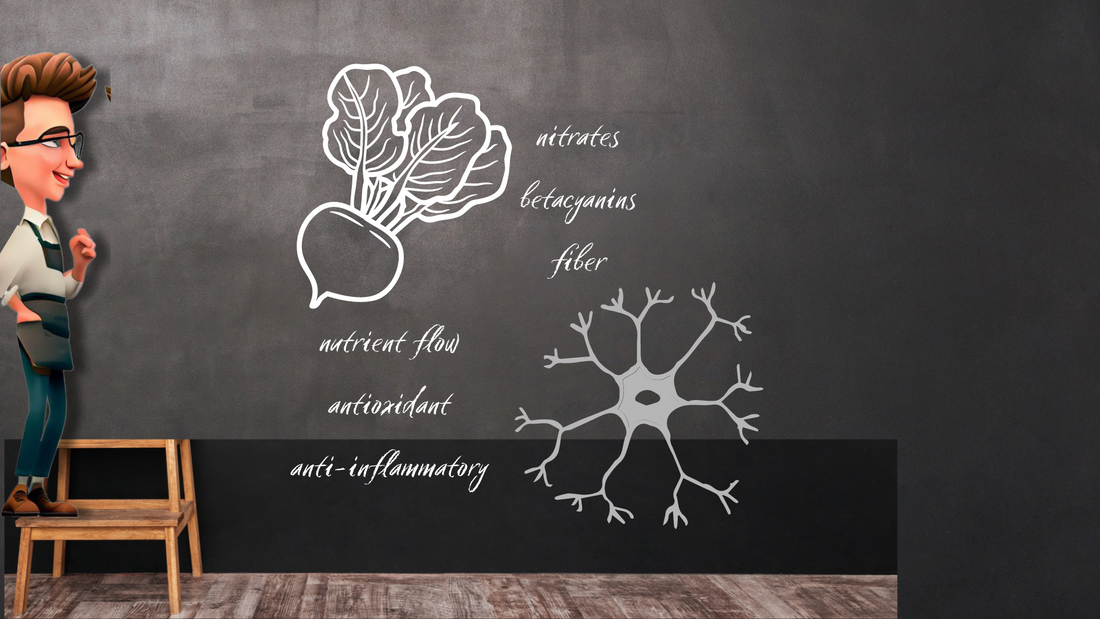Read more about supplementing with Beetroot powder extract for a healthier brain. The nitrates from beetroots support Nitric Oxide production by way of an interesting symbiosis with bacteria in our oral cavity. Nitric Oxide acts as a vasodilator, which increases flow of blood and nutrients throughout our body.
How would you like a direct pathway to potentially improving energy, memory, stamina, heart health, blood flow and immune health? It's as simple as taking beetroot powder.
Because Nitric Oxide (NO) is so crucial to our longevity, the body has developed multiple pathways to trigger its production. Beetroots are naturally high in nitrates. Friendly bacteria on your tongue reduce some of the nitrates in your saliva into nitrite, which your body converts to NO. The amount of nitrates depends upon what foods you eat that contain nitrates.
When you ingest nitrate, it either goes on to produce NO or is reabsorbed in the digestive tract and sent throughout the body. About 25% is reabsorbed in the small intestine and shunted back to your salivary glands where bacteria again reduce the nitrate to nitrite. Our body is continually working to convert nitrate to nitrite so that it's always available to convert to NO.


NO is a signaling molecule. When it's released, this gas easily and quickly penetrates nearby membranes and cells. Instantaneously, NO communicates to arteries to relax and expand. NO activates immune cells. Brain cells use NO to communicate with each other. In fact, NO sends crucial signals within every cell, tissue, and organ of the body. Most importantly, NO potentially supports the circulatory system by maintaining flexible arteries for healthy blood pressure, inhibiting the buildup of artery-clogging plaques, and reducing inflammation.
The take-home message here is that low-grade inflammation is believed to be harmful to our brains. Pure Beetroot powder is a natural way to protect the brain against chronic inflammation and oxidative stress.
Recommended use: 600 mg two or three times daily, thirty minutes before a meal.
REFERENCES OF INTEREST
- Kapil, V., et al. (2015). Dietary nitrate provides sustained blood pressure lowering in hypertensive patients: a randomized, phase 2, double-blind, placebo-controlled study. Hypertension (Dallas, Tex. : 1979), 65(2), 320–327. https://doi.org/10.1161/HYPERTENSIONAHA.114.04675
- Jarosz, J., et al. (2016). Sodium nitrate decreases agrin-induced acetylcholine receptor clustering. BMC pharmacology & toxicology, 17(1), 20. https://doi.org/10.1186/s40360-016-0062-0
- Webb, A. J. et al. (2008). Acute blood pressure lowering, vasoprotective, and antiplatelet properties of dietary nitrate via bioconversion to nitrite. Hypertension (Dallas, Tex. : 1979), 51(3), 784–790. https://doi.org/10.1161/HYPERTENSIONAHA.107.103523
- Lidder, S., & Webb, A. J. (2013). Vascular effects of dietary nitrate (as found in green leafy vegetables and beetroot) via the nitrate-nitrite-nitric oxide pathway. British journal of clinical pharmacology, 75(3), 677–696. https://doi.org/10.1111/j.1365-2125.2012.04420.x

